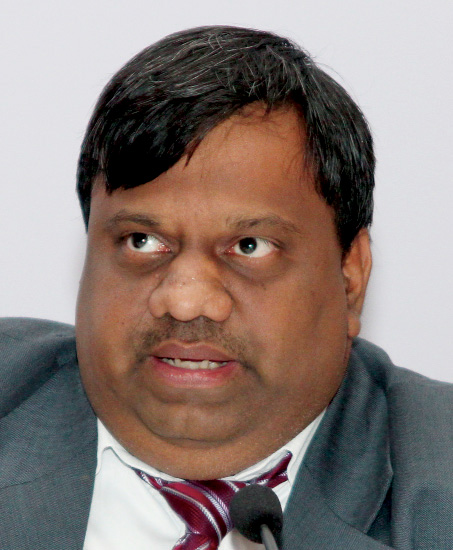In a recent development, the Ministry of Power (MoP) has made it mandatory for discoms to open and maintain a letter of credit (LC) as a payment security mechanism under power purchase agreements (PPAs). The move, which will be effective August 1, 2019, is aimed at bringing in discipline and making the sector viable. Power Line invited industry experts to comment on the expected impact of the move as well as the challenges in its implementation…
Is the power ministry’s order making it mandatory for discoms to open and maintain an LC as a payment security mechanism a step in the right direction?

Sabyasachi Majumdar
The MoP has approved the proposal formandating the opening and maintenance of an adequate LC as payment security mechanism under the PPAs tied up between discoms and gencos. The ministry has directed the National Load Despatch Center (NLDC) and Regional Load Despatch Centres to schedule and dispatch power from gencos to discoms only after the implementation of the payment security mechanism in the form of the LC by the discoms for the scheduled quantum of power, with effect from August 1, 2019. This move comes in the wake of continued payment delays by discoms to gencos, leading to liquidity constraints for power generation companies. While PPAs and power sale agreements (PSA) tied up between the power generation companies and discoms have the provision for a payment security mechanism in the form of LCs, it was not implemented by discoms in most of the states.
The MoP directive states that the NLDC and RLDCs should dispatch power only after intimation from the genco/discoms that an LC has been opened for the desired quantum of power, and the copies of the same are shared along with specifications of the period of supply; RLDC should dispatch power only to the extent of equivalent value of the LC and stop supply once the same is extinguished; and gencos should be entitled to encash the LC after expiry of the grace period, that is, 45 to 60 days, as provided in the PPA for making payments. It has been stated that in the event power is not dispatched for any reason given above, the discom should continue to pay the fixed charges to gencos. In addition, in case scheduling and dispatch of power is curtailed due to non-opening of the LC by the discom, then the discom would be liable to pay compensation to the generator as per the terms of the PPA or PSA. Moreover, SLDCs are required to ensure that discoms are not allowed to procure power from power exchanges or through short-term open access because of curtailment in supply on account of inadequate LCs.
The directive issued by the ministry is a positive step for the power generation companies, given that this, in turn, is expected to result in improved discom payment patterns. However, the implementation of these provisions remains to be seen in light of the challenges in securing a large quantum of LCs by discoms owing to their poor financial health. More importantly, cash flow improvement in a sustainable manner is critical for discoms, which require adequate tariff revision, operating efficiency improvement and timely subsidy support from respective state governments. This move may face resistance from the state governments, given that the non-provision of LCs would lead to supply curtailment and, in turn, load shedding in the distribution licensee’s area.

Rajesh Mokashi
Delays in payment for power purchase by discoms have been a major source of liquidity stress for power gencos. As per the data available on the PRAAPTI portal of the government, as on May 30, 2019, against the total outstanding dues of discoms to gencos of more than $5 billion, the overdue debt stood at over $3 billion. In this backdrop of mounting genco dues, the MoP’s move comes as a step in the right direction.
On June 28, 2019, Power Minister R.K. Singh approved the proposal to make it mandatory for distribution licensees to open and maintain an adequate LC as a payment security mechanism under PPAs. As per the proposal, the NLDC and RLDCs should dispatch power only upon intimation from the concerned genco and discoms that an LC for the desired quantum of power has been opened, and LC copies made available to the genco. The RLDC will dispatch electricity only up to the quantity equivalent to the value of the LC and will stop once the quantum of electricity under the LC is supplied. This decision, if implemented in the right spirit, is likely to bring in some discipline among discoms.

Debabrata Rout
The payment for power purchase to gencos within the stipulated time is important for the business viability of gencos, as the unit rates are allowed based on assumptions that the costs are received within a reasonable/stipulated time. If this is vitiated, the economical balance is obliterated. The MoP’s effort is in the spirit of this dire need to help the gencos to sustain their businesses.
But, it is a different story from the discoms’ perspective. Discoms have poor financial resources and are cash-strapped to carry out many social obligations of the state. The agricultural sector (which is suffering from climate change impacts), subsidies under schemes such as Saubhagya, and industries winding up due to challenges in open access/self-generation, etc. have posed many financial and other challenges. The social obligations involve poor payment discipline from consumers. These are compensated through subsidies from the state governments. The payments from the state governments do not come periodically and are also not adequate. With little support from regulators on timely tariff correction and the addition of lower strata beneficiary consumers, the financial health of discoms is getting jittery.
Making it mandatory to allow payments to gencos through LCs would be unfair to the discoms, looking at seasonality and other sensitive factors. Instead, restricting LCs to be used for power purchase from central generating stations would be better. Payments to state-owned gencos and renewable energy generators in the state may remain a state subject. It may depend on the state’s finances, which include the payment of subsidies by the state government and payments by discoms towards network expansion works which are inevitable.
Will the move help address the payment security concerns of gencos adequately? What are the likely challenges in the implementation of the order?
Rajesh Mokashi
The move appears to address the payment security concerns of gencos. It should, however, be noted that the presence of LCs as a payment security mechanism is anyway a part of the standard PPAs between gencos and discoms. Nonetheless, LCs in many of the cases were either not furnished/not renewed or not reinstated after being invoked by gencos on account of non-payment of dues. From the discoms’ angle, given their precarious financial position, they often did not have enough bank lines to support their power purchase.
If strictly implemented, in the near term, the said order is expected to result in demand curtailment by the discoms, as they may try to adjust to the new requirement, given their limited access to non-funded lines. Also, the move alone cannot solve the problems in the distribution segment; these require a number of measures on the ground such as a reduction in AT&C losses, timely release of subsidies by the state governments, receipt of cost-reflective tariff orders by discoms and the management of utilities on professional lines with no political interference.
Debabrata Rout
An LC for state-owned gencos and renewable energy generators would not be right in light of the bleak financial health of the discoms (from the sale of energy perspective). The receivables from the state government would play a significant role in defining the paying capacities. Discoms have to dynamically execute network expansion schemes on behalf of the state government or the regulator to comply with certain directives. These schemes need finances as well as interest on the borrowings to be served periodically. The financial health of the discoms shows that there would be meagre balances to meet such repayments when all the power purchase costs are paid off (either through LCs or otherwise). There is also a challenge faced by utilities in meeting the increasing operational expenditure (opex) with all the 7th Pay Commission burden, etc. The balancing of the priorities within the state has to be left to the discretion of the discoms.
As we move towards Power for All with 24×7 quality supply, sustainability of the electricity distribution business is becoming more and more important, and implementing such an order in the true spirit may compel discoms to curtail power supply to rural areas, and lead the states to give special guarantees to gencos.
